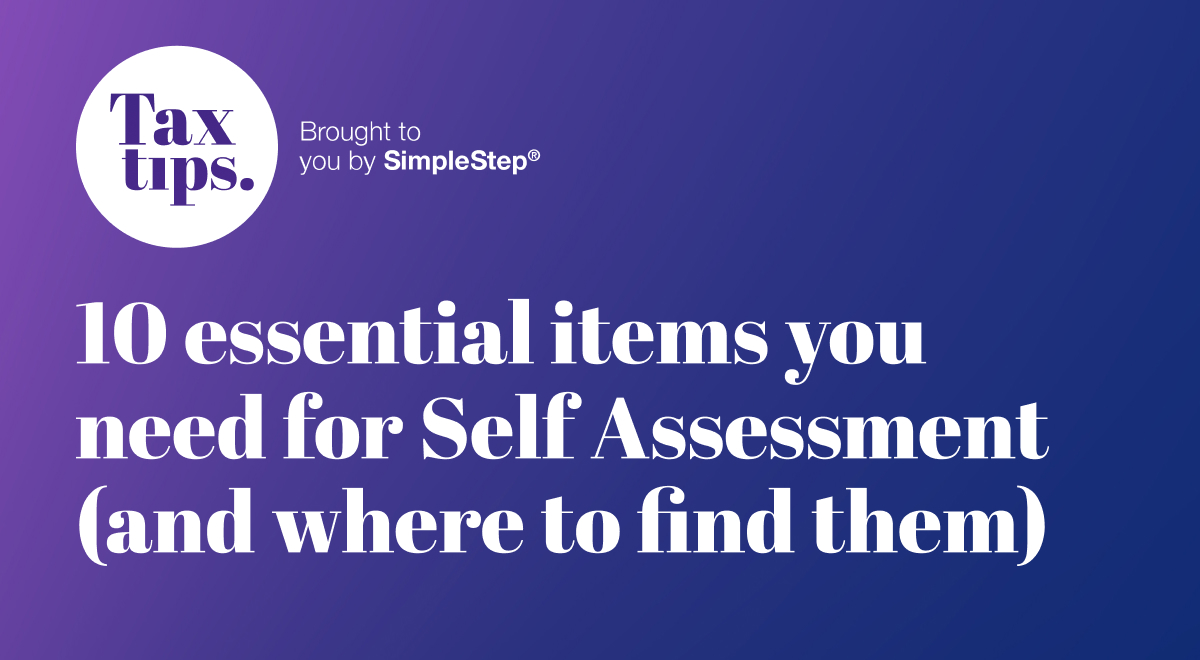TaxCalc Blog
News and events from TaxCalc
10 essential items of information you need for Self Assessment (and where to find them)

Filing a Self Assessment tax return can seem daunting, especially if you’re new to the process. To make it easier, it's crucial to gather all the necessary information before you start. Having everything to hand not only simplifies the filing process, but also reduces the likelihood of errors. Here’s a handy guide for your reference.
1. Personal information
You’ll need to provide basic personal details such as your name, address and National Insurance (NI) number. This information is necessary to identify you and ensure your return is processed correctly.
Where to find it:
Your National Insurance number can be found on your payslip, P60, tax return from a previous year, or in your personal tax account on the HMRC website.
Check HMRC has your current address on their records before filing your next tax return.
2. Unique Taxpayer Reference (UTR)
Your UTR is a ten-digit number unique to you, which is essential for filing your tax return. It’s required on all correspondence with HMRC regarding your self-assessment.
Where to find it:
You can find your UTR on previous tax returns, HMRC letters, or your online Self Assessment account.
3. Employment income
If you are employed, you’ll need to report your total income and tax paid during the tax year. This includes any salary, bonuses, and benefits-in-kind*.
Where to find it:
P60: Issued by your employer at the end of each tax year, summarising your income and tax paid.
P45: Provided by your employer when you leave a job, detailing your income and tax paid up to your leaving date.
P11D: If you receive any benefits-in-kind, such as medical insurance or company car, your employer will provide a P11D form detailing these.
4. Self-employment income
If you’re self-employed, you must report your business income and expenses. Accurate records are vital to ensure you declare the correct amounts and claim all allowable expenses.
Where to find it:
Income records: Keep invoices and review bank statements.
Expense records: Maintain a detailed log of all business-related expenses, ensuring you keep receipts and any other relevant documentation.
5. Bank and savings interest
Interest earned on your savings is taxable and must be included in your Self Assessment return.
Where to find it:
Your bank or building society will send you an annual interest statement, usually around April, detailing the interest earned and tax deducted, if any. Alternatively, review your bank statements for the year and note down any interest received.
6. Dividend income
If you own shares in a company or receive dividends from investments, you must report this income.
Where to find it:
Companies or investment platforms usually provide dividend vouchers or annual statements that summarise your dividends for the tax year.
7. Pension contributions
Pension contributions can affect your tax liability, especially if you're claiming tax relief on contributions to personal or stakeholder pensions.
Where to find it:
Your pension provider will issue an annual statement detailing your contributions, and any tax relief claimed. Some employers also provide this information on your payslip.
8. Rental income
If you receive income from renting out property, this needs to be declared. You can deduct certain expenses, such as maintenance and repair costs, to reduce your taxable rental income.
Where to find it:
Keep records of all rental payments received and expenses incurred, such as repairs, insurance, and mortgage interest.
Your letting agent (if you use one) may provide statements periodically that summarise your rental income and expenses.
9. Capital gains
If you’ve sold assets such as property, shares, or other investments, you may be liable for Capital Gains Tax (CGT). You’ll need to report the details of any disposals and calculate any gain or loss.
Where to find it:
Keep records of the purchase and sale dates, costs involved, and any other expenses related to the acquisition and disposal of the asset.
Investment platforms and brokers often provide annual summaries or transaction histories.
10. Charitable donations
Donations to charity under the Gift Aid scheme can reduce your tax bill. You’ll need to report these contributions to claim the appropriate relief.
Where to find it:
Charities should provide receipts or acknowledgments of donations made, including confirmation that Gift Aid was claimed.
Conclusion
Compiling the correct information for your Self Assessment tax return is essential to ensure accuracy and compliance with HMRC’s requirements. By gathering documents such as your P60, P11D, and records of all income and expenses, you can simplify the filing process and avoid potential mistakes. Make sure to store this information securely and consult with a tax professional if you’re unsure about any aspect of your return. The more organised you are, the smoother your Self Assessment experience will be.
*A Benefit in Kind (BIK) refers to any non-cash perk or service of monetary value that an employer provides to an employee for personal use. Often called 'fringe benefits,' these perks are not exclusively for business purposes and are therefore classified as BIKs. Since BIKs have a monetary value, they are subject to taxation, functioning as a supplement to an employee's salary. Taxing these benefits ensures that compensation isn't shifted entirely to non-cash perks to avoid tax. BIKs can include a wide range of items, such as company cars, private healthcare, and more, all of which contribute to your overall taxable income and may need to be reported.
When it comes to tax, trust TaxCalc every time.
For a simpler way to file your tax, download TaxCalc’s award-winning tax return software today!
Learn more
What If? Planner
Plan for scenarios, adjusting your levels of income and see the effects of decisions being made now on next year's tax bill.
Learn more

VAT Filer for Business
If you’re ready and required to file VAT returns, TaxCalc’s VAT Filer for Business is a simple, quick and affordable solution.
Learn more



